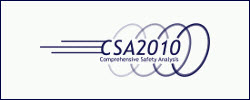
Under CSA 2010, CMV carrier and driver safety performance records will be more important than ever and all safety-based violations from roadside inspections will count, not just OOS violations. Drivers should know what CSA 2010 will mean for them and how they can prepare for this important, new safety program.
Why does FMCSA's new CSA 2010 program emphasize driver safety enforcement?
Studies have shown that unsafe driver behavior, both on the part of CMV drivers and other drivers, is a major contributor to CMV-related crashes. Some studies indicate that a small segment of the CMV driver population is involved in a disproportionately large number of crashes. As a result, during the CSA 2010 Operational Model Test, FMCSA is expanding its approach to identifying and addressing unsafe drivers during interventions with motor carriers.
Can you describe the CSA 2010 driver safety enforcement process?
The driver safety enforcement process provides FMCSA with the tools to identify CMV drivers with safety performance problems and to verify and address the issues. The new tools enable Safety Investigators (SIs) to identify drivers with poor safety histories who work for carriers that have been identified as requiring a CSA 2010 investigation. If the investigation results verify the driver violation(s), FMCSA takes an enforcement action against that driver, such as a Notice of Violation (NOV) or a Notice of Claim (NOC).
What kinds of driver safety performance data is CSA 2010 looking at?
The new program focuses on driver enforcement for serious rule violations, such as:
- Driving while disqualified
- Driving without a valid commercial driver's license
- Making a false entry on a medical certificate
- Committing numerous Hours-of-Service violations
Do tickets or warnings that drivers receive while operating their personal vehicles impact the new SMS?
No. Tickets or warnings that drivers receive while operating their personal cars are State citations and do not count in the new measurement system. SMS only uses violations of FMCSA's regulations, and those regulations only apply to people driving large CMVs. In measuring on-road safety performance, SMS uses all safety-based violations documented at roadside inspections as well as State reported crashes.
Will CSA 2010 assign safety ratings to individual CMV drivers?
I heard that CSA 2010 is designed to rate CMV drivers and to put many of them out of work this summer. Is that true?
No. Under CSA 2010, individual CMV drivers will not be assigned safety ratings or Safety Fitness Determinations (SFDs). Consistent with the current safety rating regulations (49 CFR part 385), individual drivers who operate independently as a "motor carrier" (i.e. have their own USDOT number, operating authority, and insurance) will continue to be rated as a motor carrier, as they are today, following an onsite investigation at their place of business. CSA 2010 is designed to meet one overriding objective: to increase safety on the Nation's roads. Therefore, it is, by design, a positive program for drivers and carriers with strong safety performance records. CSA 2010 sends a strong message that drivers and carriers with poor safety performance histories need to improve.
What is the Pre-Employment Screening Program (PSP) and when does it start?
PSP is a new FMCSA program mandated by Congress that is designed to assist the motor carrier industry in assessing individual operators' crash and serious safety violation history as a pre-employment condition. The program is voluntary. It is not part of CSA 2010. The system is expected to launch in 2010. For more information about PSP, visit FMCSA's PSP website
What is the detailed process for drivers to contest information contained in their FMCSA driver records?
Drivers should use FMCSA's DataQs system to challenge data in FMCSA databases. To do this, drivers can go to the DataQs registration page, select "Register Online" as a general public user, and create a DataQs account profile. Once registered, drivers can challenge their data by following detailed instructions in the help menu. The Agency is in the process of improving the DataQs Website to make the process of challenging data more apparent to drivers.
